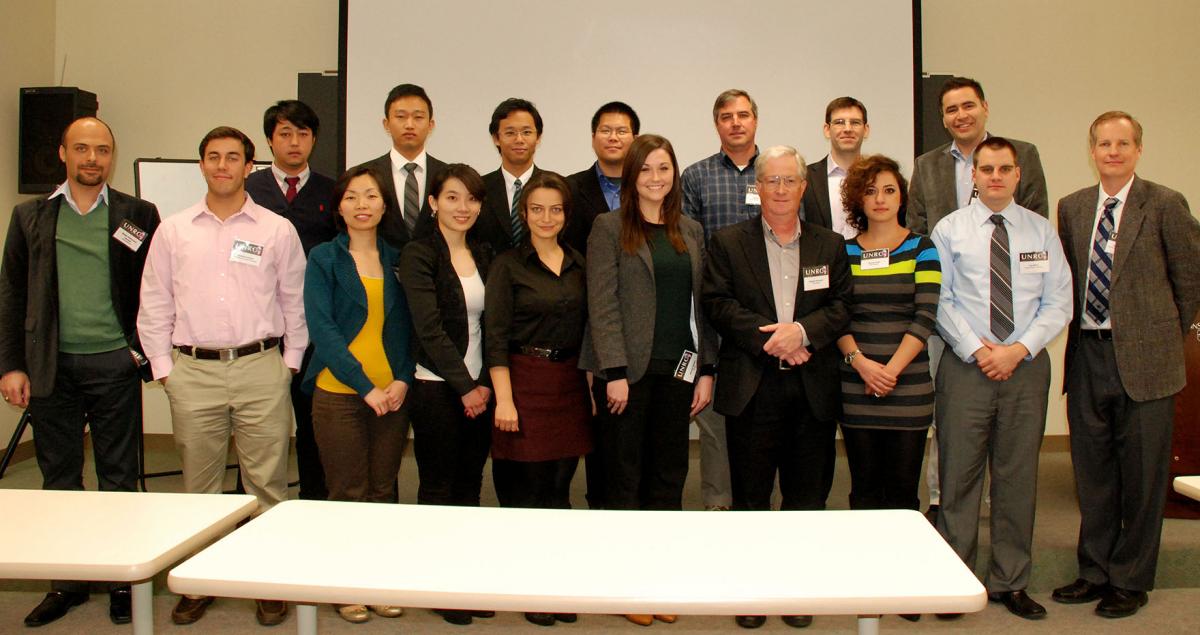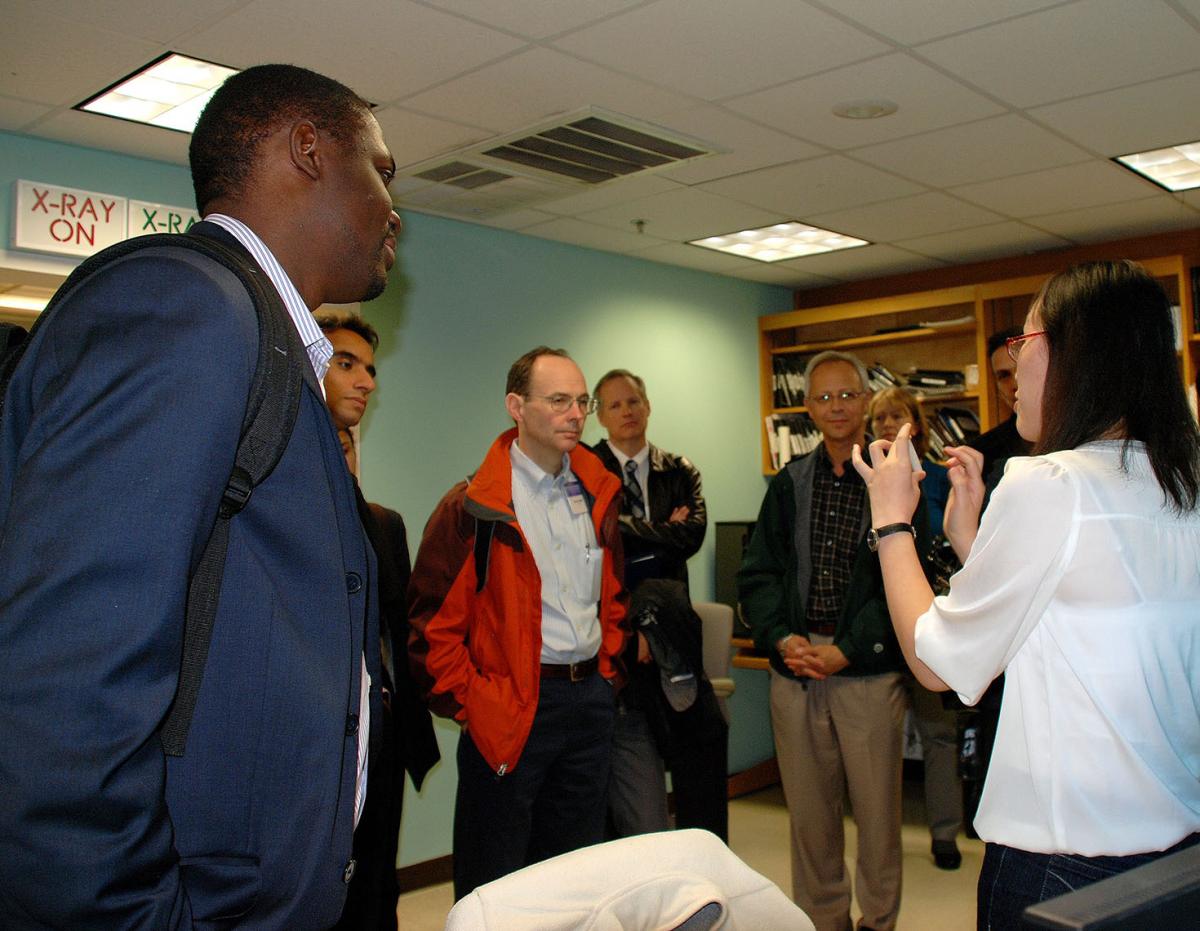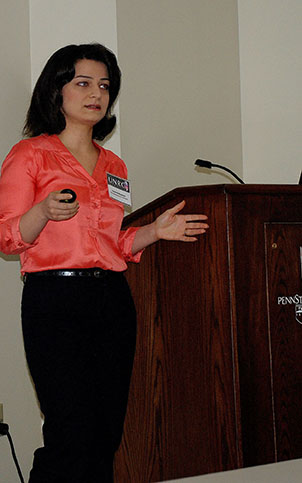Industrial driven research consortia are beneficial for everyone involved, especially student researchers
The EMS Energy Institute is primarily a research institution and our responsibility to students is to provide them with practical research training to augment their coursework. While many of the graduate students at Penn State hope to find positions in academia, many more hope to find employment in industry. One way that the Institute is able to offer real-world research experience is through industrial partnerships and consortia. These research hubs provide a framework for energy companies to fund research, receive progress updates, and contribute to decisions on research direction. In addition, these consortia offer networking opportunities for students and industry representatives that can lead to future internship or career connections.
Two of the industry-driven consortia administered by the Institute are the Gas Flooding Joint Industry Project (JIP) and the Unconventional Natural Resources Consortium (UNRC). The Gas Flooding JIP, managed by Russell Johns, professor of petroleum and natural gas engineering, focuses on issues surrounding gas flooding, or the injection of gasses into reservoirs to increase production. UNRC, managed by Luis Ayala, associate professor of petroleum and natural gas engineering and associate department head for graduate education, focuses on the reservoir engineering areas of unconventional natural gas exploration and production technology with an emphasis on shale gas, tight gas, and shale oil formations.
These groups have about nine industrial members between them. Companies include Shell, Chevron, BP, OMV Exploration and Production, and Kuwait Oil Company, among others. These consortia projects support research for more than 15 graduate students. As part of the group, students are required to present their work to industry representatives at annual workshops. The industrial members are able to provide feedback and suggestions directly to the students.
“Company representatives give us their advice and their advice leads us to do research on the topics that are beneficial in the oil industry and of practical use,” said Bahareh Nojabaei, a doctoral candidate in petroleum engineering currently participating in the Gas Flooding JIP and the UNRC.
Interactions with company representatives are not limited to once a year. Students receive e-mail inquiries for updates throughout the year. The students can also contact consortia members for advice or information on field data. By becoming affiliated with a research consortium, students learn, first hand, about current issues affecting industry and how they might adjust their work to address those issues. These students also provide real results and software toolkits to industrial members for immediate use in the industry.
“I hope we can have more oil companies involved in such [joint industry] groups at Penn State,” said Nojabaei. “Such joint industry projects help both universities and companies to offer solutions for practical problems.”

Students, faculty, and industry members at a UNRC workshop.
Two students, Bahareh Nojabaei and Saeid Khorsandi Kouhanestani, doctorate candidates in petroleum engineering, are working on projects for the UNRC and Gas Flooding JIP consortia. They shared a little bit about their positive experiences.
Tell me about your doctorate research.
Saeid Kouhanestani: I am developing analytical solutions for gas flooding problems that can be used to optimize recovery efficiency of gas flooding processes. The results can be used to improve performance of current simulation and flash calculation methods.
Bahareh Nojabaei: I am researching the effect of capillary pressure on phase behavior of reservoir fluid and production from tight rocks. I am also looking at the effect of capillary pressure on minimum miscibility pressure for gas flooding of shales. We are developing an extended black oil model to simulate production and gas injection for tight reservoirs.
 Industry members receive a tour during a Gas Flooding JIP meeting.
Industry members receive a tour during a Gas Flooding JIP meeting.
How did you come to be a part of the Gas Flooding/UNRC research group(s)?
SK: I have a bachelor’s degree in petroleum engineering from Petroleum University of Technology at Ahwaz-Iran and master’s degree in reservoir engineering from Sharif University of Technology at Tehran-Iran. I was working on phase behavior for my master’s project. Dr. Russell Johns is well known for his work in enhanced oil recovery and I found Dr. Johns research very interesting. The cutting edge research in gas flooding is scientific and applicable.
BN: My background is in mechanical engineering and thermal fluid sciences. I did my bachelor and master’s degrees in Iran. I moved to the U.S. to accompany my husband to complete his doctorate at Penn State. I was looking for a doctorate position at Penn State that was relevant to mechanical engineering, but more practical. I found the Energy and Mineral Engineering Department to be very practical and decided to do my doctoral degree in petroleum engineering. My advisor, Dr. Johns, and other faculty members formed these research groups, funded by major oil companies and doing research on practical topics. I was interested to be involved in both gas flooding and UNRC research groups.
How has being affiliated with the Gas Flooding/UNRC consortia enhanced your research experience at Penn State?
BN: We communicate with the companies through these research groups. We learn the major practical issues and problems facing the oil and gas industry so we can get ideas to do research on such topics to solve these issues.

Bahareh Nojabaei presents at a UNRC meeting.
How has working with the Gas Flooding JIP given you a feel for real industry issues?
SK: The annual presentations give us the chance to represent our work for technical experts. They critique our work, which helps us find the correct direction for future research. Gas Flooding JIP research targets real problems in industry and the results of our research have direct application in industry. However, our research is not only focused on solving specific problems in industry, we also develop new ideas and tools to improve current processes of industry.
What are your career goals and how is your experience with Gas Flooding/UNRC helping you to meet those goals?
SK: I would like to join an oil company. My long-term career goal is to continue the research in the field of phase behavior and enhanced oil recovery. With the Gas Flooding JIP, I have the chance to communicate with industry representatives, which could help me find a position with an oil company. Also the research in Gas Flooding JIP is similar to the research in R&D departments of oil companies.
BN: I will be looking for a faculty position in petroleum engineering in near future. If I will be an assistant professor in petroleum engineering, I need to work with oil companies and I should be involved in such joint industry projects.

